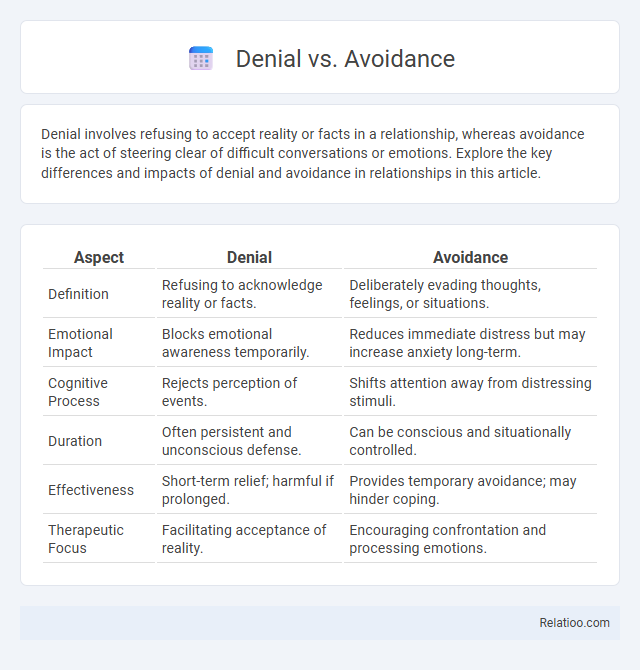Denial involves refusing to accept reality or facts in a relationship, whereas avoidance is the act of steering clear of difficult conversations or emotions. Explore the key differences and impacts of denial and avoidance in relationships in this article.
Table of Comparison
| Aspect | Denial | Avoidance |
|---|---|---|
| Definition | Refusing to acknowledge reality or facts. | Deliberately evading thoughts, feelings, or situations. |
| Emotional Impact | Blocks emotional awareness temporarily. | Reduces immediate distress but may increase anxiety long-term. |
| Cognitive Process | Rejects perception of events. | Shifts attention away from distressing stimuli. |
| Duration | Often persistent and unconscious defense. | Can be conscious and situationally controlled. |
| Effectiveness | Short-term relief; harmful if prolonged. | Provides temporary avoidance; may hinder coping. |
| Therapeutic Focus | Facilitating acceptance of reality. | Encouraging confrontation and processing emotions. |
Understanding Denial and Avoidance
Denial involves rejecting the reality of a stressful situation, preventing emotional processing and often leading to prolonged distress. Avoidance manifests as consciously steering clear of thoughts, feelings, or situations associated with stress to reduce discomfort temporarily. Both denial and avoidance hinder effective coping by limiting self-awareness and delaying problem resolution, distinguishing them from harmful coping strategies that may involve destructive behaviors.
Key Differences Between Denial and Avoidance
Denial involves refusing to accept reality or facts, whereas avoidance is the act of deliberately steering clear of distressing situations or emotions. Denial distorts an individual's perception by rejecting the existence of problems, while avoidance acknowledges the problem but opts not to confront it. Harmful coping includes both denial and avoidance but extends to behaviors that further impair mental health, such as substance abuse or self-harm.
Psychological Foundations of Denial
Denial operates as a psychological defense mechanism rooted in the unconscious refusal to accept reality or facts, thereby protecting the individual from anxiety and emotional distress. This coping strategy contrasts with avoidance, which involves consciously evading stressors or uncomfortable situations, and harmful coping, which encompasses maladaptive behaviors like substance abuse or self-harm that exacerbate psychological harm. Understanding the neurobiological and cognitive foundations of denial reveals its role in modulating emotional responses by altering perception and memory processing to maintain psychological equilibrium.
Psychological Foundations of Avoidance
Avoidance behavior in psychology is rooted in the mechanism of negatively reinforcing fear or anxiety by escaping or evading perceived threats, which differs from denial, where an individual refuses to acknowledge reality, and from harmful coping, which involves maladaptive behaviors causing long-term harm. The psychological foundation of avoidance is linked to operant conditioning, where avoidance is reinforced because it reduces immediate distress, perpetuating anxiety disorders and interfering with emotional processing. Chronic avoidance can prevent individuals from confronting and resolving underlying issues, maintaining pathology and impairing psychological resilience.
Common Signs of Denial
Common signs of denial include refusing to acknowledge painful emotions, minimizing the severity of a problem, and consistently avoiding discussions about distressing situations. You may notice persistent excuses or rationalizations that prevent confronting reality, leading to delayed problem-solving and increased stress. Recognizing these behaviors early helps differentiate denial from avoidance and harmful coping mechanisms, enabling more effective emotional management.
Typical Behaviors of Avoidance
Typical behaviors of avoidance include steering clear of situations, thoughts, or emotions that trigger stress or anxiety, often leading to procrastination or social withdrawal. Individuals may engage in distraction techniques such as excessive screen time, substance use, or escapism to prevent confronting underlying issues. This coping mechanism can exacerbate problems by delaying resolution and increasing emotional distress over time.
Impact of Denial on Mental Health
Denial as a coping mechanism distorts reality and prevents individuals from addressing underlying mental health issues, often exacerbating anxiety and depression. Unlike avoidance, which temporally sidesteps stressors, denial involves a refusal to accept facts, leading to prolonged emotional distress and impaired problem-solving abilities. This persistent suppression can hinder therapeutic progress and increase the risk of chronic psychological disorders.
Consequences of Avoidance in Daily Life
Avoidance in daily life often leads to increased stress, unresolved problems, and diminished emotional well-being as it prevents you from addressing core issues effectively. Unlike denial, which is a refusal to accept reality, avoidance involves actively evading uncomfortable situations, resulting in missed opportunities and decreased productivity. Harmful coping mechanisms can intensify these consequences by fostering a cycle of procrastination, anxiety, and impaired relationships.
Strategies to Overcome Denial and Avoidance
Recognizing denial and avoidance is the first step toward developing healthier coping mechanisms that can improve mental well-being. You can overcome these behaviors by practicing mindfulness, seeking professional therapy, and gradually confronting uncomfortable emotions through small, manageable steps. Building a strong support network combined with cognitive-behavioral techniques helps replace harmful coping with adaptive strategies that enhance emotional resilience.
Seeking Help: When Professional Support is Needed
Recognizing when denial, avoidance, or harmful coping mechanisms interfere with your well-being is crucial for seeking professional help. Therapists and counselors provide evidence-based strategies to address underlying issues and promote healthy emotional processing. Timely intervention can prevent escalation of mental health problems and improve overall resilience.

Infographic: Denial vs Avoidance
 relatioo.com
relatioo.com